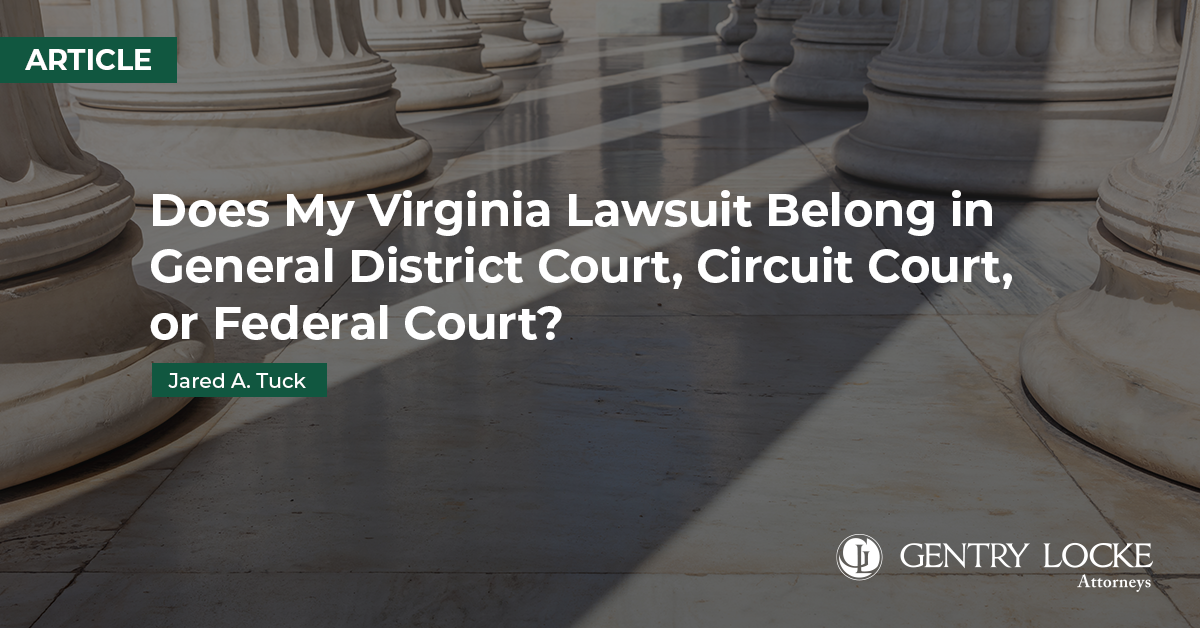Does My Virginia Lawsuit Belong in General District Court, Circuit Court, or Federal Court?

As a plaintiff personal injury attorney, clients often wonder which court their case will be filed in. This article will discuss the three trial courts in which a Virginia civil lawsuit can potentially be filed—general district court, circuit court, and federal district court.
General District Court
In Virginia, general district courts have jurisdiction over almost all types of civil claims up to $50,000.[1] In other words, any claim for breach of contract, personal injury, or property damage not exceeding $50,000 can be filed in general district court.[2] If you have a contract, personal injury, or property damage claim for $4,500 or less, then it must be filed in general district court.[3] In general district court, a judge will hear your case—there are no juries. General district court can be an advantageous place to file a lawsuit if you have a small claim. This court is designed to handle a large volume of smaller claims, which means that your case will go to trial much faster than in circuit court or federal court. Additionally, litigation is much cheaper in general district court because the filing fees are lower and the discovery process is very limited.
Circuit Court
In Virginia, circuit courts have jurisdiction over all civil claims exceeding $4,500.[4] This means that if you have a contract, personal injury, or property damage claim between $4,501 and $50,000, then you have a choice of filing your case in either general district court or circuit court. If your claim is for more than $50,000, then you must file it in either circuit court or federal court, but it can only be filed in federal court under certain circumstances, as discussed below.
In circuit court, both judges and juries decide cases, depending on the nature of the dispute and whether a jury trial has been demanded by the parties. In circuit court, parties can conduct a significant amount of discovery by taking depositions and sending written interrogatories, requests for production of documents, requests for admission, subpoenas duces tecum, etc. Due to the higher value of the claims and additional discovery methods, circuit court cases often do not go to trial until a year or two after they are filed. The additional discovery methods also increase litigation costs and attorney’s fees when compared to general district court.
Federal District Court
Certain types of lawsuits can be filed in federal district court. Generally, these lawsuits fall into two buckets: (1) cases involving a federal question, and (2) cases involving diversity of citizenship where the amount in controversy is $75,000 or more.[5] Federal question jurisdiction is when your claim arises under the Constitution, laws, or treaties of the United States.[6] In other words, if you are seeking a court order to hold that a law is unconstitutional or you are suing someone for a cause of action that is provided under a federal statute, then you can file your lawsuit in federal district court.[7] You can also file your case in federal district court if the defendants are citizens of states different from your state of citizenship and the amount in controversy is $75,000 or more.[8] This is called diversity of citizenship jurisdiction.
Federal district court is more like Virginia circuit court than general district court. In federal district court, both judges and juries decide cases, depending on the nature of the dispute and whether a jury trial has been demanded by the parties. Just like circuit court, parties can conduct a significant amount of discovery by taking depositions and sending written interrogatories, requests for production of documents, requests for admission, subpoenas duces tecum, etc. It generally takes a year or more for your case to go to trial. Although there are many similarities between federal district court and Virginia circuit court, there are also many differences. Federal district courts adhere to their own rules of civil procedure and rules of evidence. Additionally, in federal district court, juries are selected from a larger geographic area.
Which Court Do I File My Lawsuit In?
If you file your lawsuit in the wrong court, it will likely be dismissed and depending on whether the statute of limitations has run, you might not be able to refile the lawsuit in the correct court. All three courts have different rules, which can greatly influence your chances of prevailing. Often, claims can be filed in multiple courts, and there are many practical and strategic considerations when deciding where to file. Additionally, sometimes a case can be transferred, appealed, or removed from one court to another. This is why it is imperative to retain a Virginia trial lawyer that handles cases in all three courts. An attorney that handles cases in all three courts will be intimately familiar with the rules of each, and they will be able to properly advise you where your Virginia lawsuit belongs.
If you have questions about where your lawsuit should be filed or need guidance navigating Virginia’s court system, the experienced trial attorneys at Gentry Locke are here to help. Our team regularly represents clients in general district court, circuit court, and federal court, and we understand the strategies and nuances unique to each. Contact us today to discuss your case and learn how we can protect your rights and pursue the best possible outcome for you.
[1] See Va. Code § 16.1-77.
[2] See id.
[3] See id.
[4] See id.; Va. Code § 17.1-513.
[5] See 28 U.S.C. § 1331; 28 U.S.C. § 1332.
[6] See 28 U.S.C. § 1331.
[7] See id.
[8] See 28 U.S.C. § 1332.





